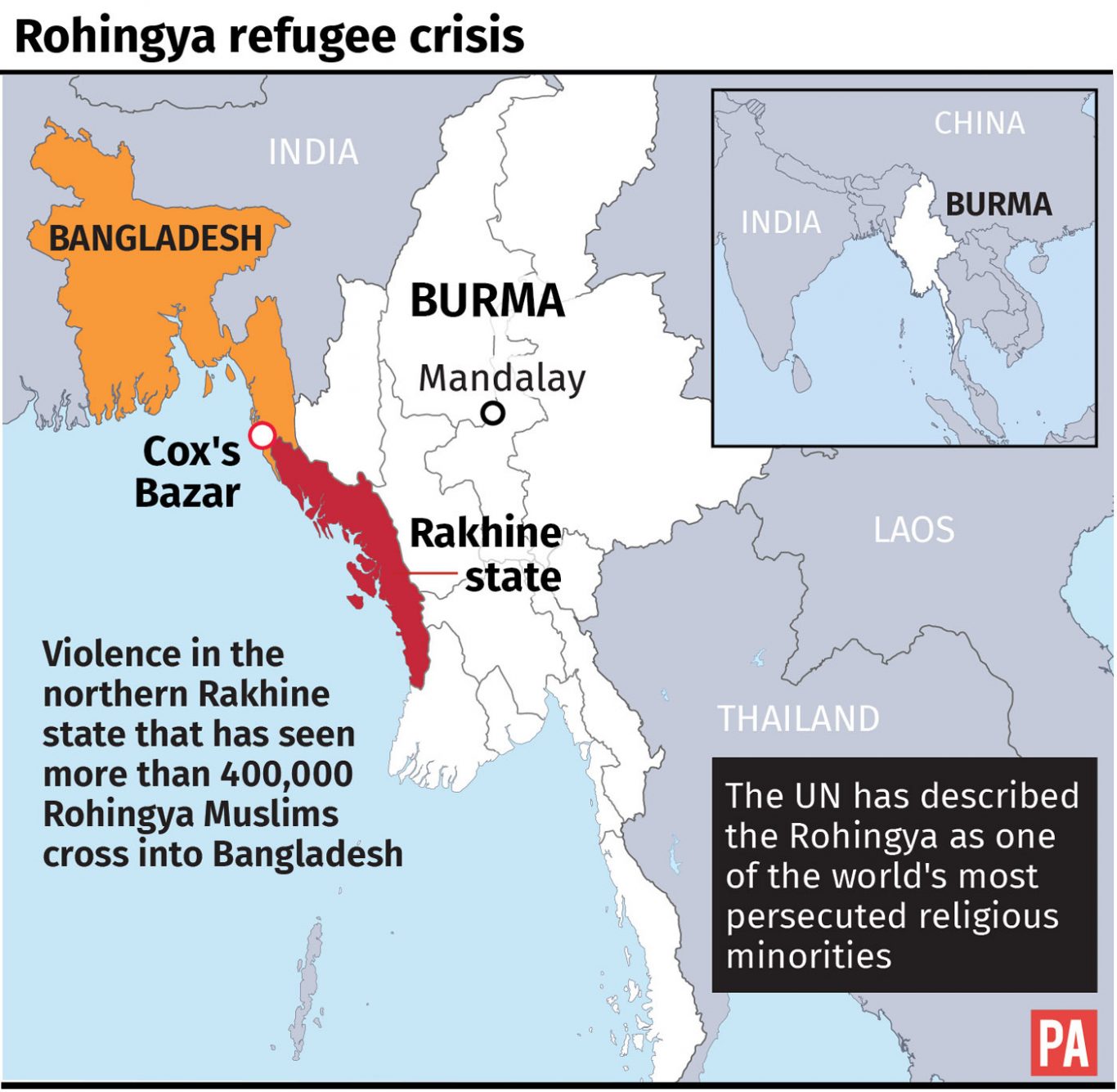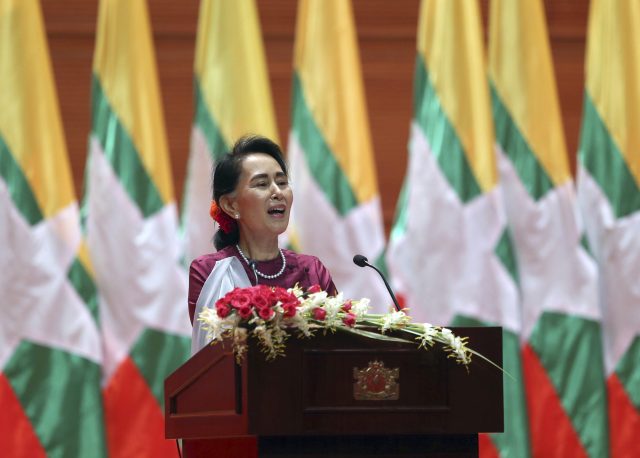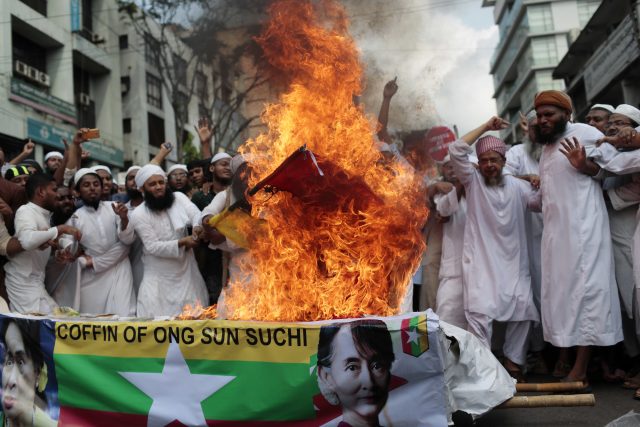
Britain is to withdraw engagement with Burma’s military until the campaign of violence against the Muslim Rohingya minority is ended.
The Ministry of Defence will suspend training work in the south-east Asian country, said Prime Minister Theresa May’s official spokesman.
The move came after Foreign Secretary Boris Johnson joined representatives of the US, Bangladesh, Indonesia, Turkey, Australia, Canada, Sweden and Denmark to raise the issue with Burma’s national security adviser on the margins of the United Nations General Assembly in New York.
Burma’s civilian leader Aung San Suu Kyi has defended the treatment of the Rohingyas, hundreds of thousands of whom have fled their homes, many seeking refuge in neighbouring Bangladesh.
Mrs May’s spokesman told reporters in New York: “As of today, the Ministry of Defence are saying that there will be no more defence co-operation or training with the Burmese army until we are satisfied that this has been resolved.
“It is about recognising the seriousness of the situation. We want this situation resolved and until it is this co-operation will cease.
“We have condemned what has been happening right from the outset. There have been repeated statements from the Foreign Secretary and myself. This is a further recognition that we want this situation resolved. What is happening there simply can’t continue.”
 (PA Graphics)
(PA Graphics)
Ms Suu Kyi, a Nobel peace prize winner, has stayed away from the UN gathering but used a speech in Burma to respond to the outcry over the situation.
She told foreign diplomats in the Burmese capital Naypyidaw that “more than half” of the Rohingya villages were not affected by the violence.
She invited diplomats to visit the settlements to learn, along with the government, “why are they not at each other’s throats in these particular areas”.
 The Burmese leader’s public profile has been tarnished by the events (Aung Shine Oo/AP)
The Burmese leader’s public profile has been tarnished by the events (Aung Shine Oo/AP)
Ms Suu Kyi said: “I understand that many of our friends throughout the world are concerned by reports of villages being burned and of hordes of refugees fleeing.
“There have been no conflicts since September 5 and no clearance operations. We too are concerned, we want to find out what the real problems are.”
In New York Mr Johnson said the “terrible human rights abuses and violence” in Rakhine province “are a stain on the country’s reputation”.
“No one wants to see a return to military rule, so it is vital that Aung San Suu Kyi and the civilian government make clear these abuses must stop,” he said.
 Bangladeshi activists from various Islamic groups burn a national flag of Burma (AM Ahad/AP)
Bangladeshi activists from various Islamic groups burn a national flag of Burma (AM Ahad/AP)
Former international development secretary Andrew Mitchell accused the Burmese authorities of “ethnic cleansing” but defended the British role in providing training to the country’s military.
Ms Suu Kyi faces being stripped of the freedom of Oxford, the city where she studied and lived, as the council leader and lord mayor said she has “failed to live up to the reputation and beliefs we associated with you”.
She read philosophy, politics and economics at St Hugh’s College between 1964 and 1967, and spent much of the 1980s living in the city with her husband, Tibetan scholar Michael Aris, and their two sons, Kim and Alexander.
During her long campaign for democracy in Burma she was awarded the freedom of the city in 1997, an honour she accepted in person in 2012.


Why are you making commenting on The Herald only available to subscribers?
It should have been a safe space for informed debate, somewhere for readers to discuss issues around the biggest stories of the day, but all too often the below the line comments on most websites have become bogged down by off-topic discussions and abuse.
heraldscotland.com is tackling this problem by allowing only subscribers to comment.
We are doing this to improve the experience for our loyal readers and we believe it will reduce the ability of trolls and troublemakers, who occasionally find their way onto our site, to abuse our journalists and readers. We also hope it will help the comments section fulfil its promise as a part of Scotland's conversation with itself.
We are lucky at The Herald. We are read by an informed, educated readership who can add their knowledge and insights to our stories.
That is invaluable.
We are making the subscriber-only change to support our valued readers, who tell us they don't want the site cluttered up with irrelevant comments, untruths and abuse.
In the past, the journalist’s job was to collect and distribute information to the audience. Technology means that readers can shape a discussion. We look forward to hearing from you on heraldscotland.com
Comments & Moderation
Readers’ comments: You are personally liable for the content of any comments you upload to this website, so please act responsibly. We do not pre-moderate or monitor readers’ comments appearing on our websites, but we do post-moderate in response to complaints we receive or otherwise when a potential problem comes to our attention. You can make a complaint by using the ‘report this post’ link . We may then apply our discretion under the user terms to amend or delete comments.
Post moderation is undertaken full-time 9am-6pm on weekdays, and on a part-time basis outwith those hours.
Read the rules here